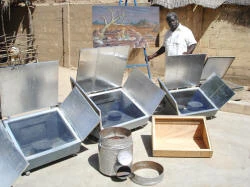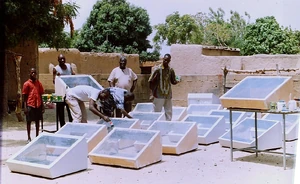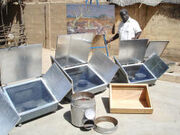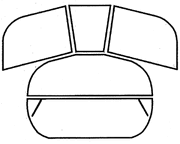
Gnibouwa Diassana with several of his solar box cookers
Gnibouwa Diassana of Bla won a "2006 Ashden Award for Sustainable Energy" worth 2,500 pounds sterling. The funds will enable his project Sun for All to increase production of cookers and to reach out to more women's groups and other community organizations. Diassana has built a variety of solar cookers, plus a solar food dryer and solar water heater. Most of the solar cookers he has built are of the box type with three reflectors, based on a design by the Swiss organization ULOG. He has found homes for most of the cookers with organizations of artisans, nonprofits, women's groups and individual families. He reports that the cookers have been adapted for Mali and can be constructed with locally available materials and tools, even in remote areas. Mr. Diassana current works for World Vision Mali.

Forty solar cookers were distributed in an April 2007 project in the village of Nara in the west of Mali.
To facilitate getting cookers into the hands of people who need them, Diassana has sold cookers at half price or on credit. He has been able to follow up directly with most of the users and observes that they are using less conventional fuel. He estimates that about 950 people have directly benefited from his cookers, while 10,000 more have witnessed solar cooking at his exhibitions and demonstrations. Radio and television coverage has spread the word further. Diassana reports that the effects of deforestation have become increasingly visible near Bla in the past few years, and that his work with solar cooking is meant to address this problem while also helping women save money and time and reduce their exposure to smoke. His project has received some outside support, but his personal donations have sometimes exceeded 40% of the project's budget. He credits Roger Bernard of France and Angela Calvo of Italy as his main solar cooking influences. With his new funds from England to promote Swiss-designed cookers, Diassana illustrates the international connectivity in solar cooking.

Diassana Last Tree
News and recent developments

Here are 8 cookers Nelpa for Mali Soleil, an association of students living in France. The cookers are destined for people in the western region of Mali, the region of kayes which has depleted its supply of trees for fire wood.
- August 2009: Gnibouwa Diassana has delivered eight solar cookers to Mali Soleil for use in Malian villages.

Here are 8 cookers Nelpa for Mali Soleil, an association of students living in France. The cookers are destined for people in the western region of Mali, the region of kayes which has depleted its supply of trees for fire wood
- March 2008: Longtime solar cooker builder and promoter Gnibouwa Diassana reports that 40 solar box cookers have been assembled and distributed to villagers in Nioro du Sahel, near the border with Mauritania. Nioro du Sahel suffers from an acute shortage of firewood for cooking. Diassana says that a special cooking vessel has been made to accommodate the local staple of couscous with millet or corn.
- May 2008: Solar cooking is always ongoing in Mali by the promotion of our localproducts such peanut, mango, cocoa, banana, date. Here are demontrations, training of young girls on how to cook, make bead ( baking), cakes, cookies, meat loaf/ meat balls. Also how to cook pate with hard egs called "pate de berichon, pate de paques / for Easter. By many adaptations, we can use solar for all cooking needs, for all food habit around the world,that will be the success way and the proof that the uses of solar devices is a simple solution to a complex problem. The photo shows my wife Lea Diassana.
- April 2007: Gnibouwa Diassana of World Vision Mali reports on a project designed to improve the lives of women in the village of Nara in the west of Mali, not far from Mauritania. His organization brought 40 cookers to this area is in the deep Sahel with acute shortage of firewood. They report designing a special cooking vessel for couscous made with millet or corn, which is the local staple.

Gnibouwa Diassana with several of his solar box cookers
- August 2006: Gnibouwa Diassana of Bla won a "2006 Ashden Award for Sustainable Energy" worth 2,500 pounds sterling. The funds will enable his project Sun for All to increase production of cookers and to reach out to more women's groups and other community organizations. Diassana has built a variety of solar cookers, plus a solar food dryer and solar water heater. Most of the 95 solar cookers he has built are of the box type with three reflectors, based on a design by the Swiss organization Group ULOG. He has found homes for most of the cookers with organizations of artisans, nonprofits, women's groups and individual families. He reports that the cookers have been adapted for Mali and can be constructed with locally available materials and tools, even in remote areas. To facilitate getting cookers into the hands of people who need them, Diassana has sold cookers at half price or on credit. He has been able to follow up directly with most of the users and observes that they are using less conventional fuel. He estimates that about 950 people have directly benefited from his cookers, while 10,000 more have witnessed solar cooking at his exhibitions and demonstrations. Radio and television coverage has spread the word further. Diassana reports that the effects of deforestation have become increasingly visible near Bla in the past few years, and that his work with solar cooking is meant to address this problem while also helping women save money and time and reduce their exposure to smoke. His project has received some outside support, but his personal donations have sometimes exceeded 40% of the project's budget. He credits Roger Bernard of France and Angela Calvo of Italy as his main solar cooking influences. With his new funds from England to promote Swiss-designed cookers, Diassana illustrates the international connectivity in solar cooking.
Diassana CooKit variation

Figure 1
Mr. Gnibouwa Diassana has been able to find sources for all the materials for the CooKit solar panel cooker in or near Bla. “Cardboard is available in big towns,” he writes. “Plywood, glass, aluminum foil, sheet metal and plastic bags are available in Bla and neighboring towns.”

Figure 2
Mr. Diassana also applies creative thinking to obtain low-cost materials. He notes that tea, a very popular beverage in Mali, is shipped from China in boxes lined with aluminum foil which can be recovered and reused for making reflectors for solar cookers. “It works well,” he says.
What is lacking in Bla, however, are large pieces of cardboard. To adapt to this problem, Mr. Diassana makes solar CooKits from five pieces of cardboard (see figure 1), which he patches together using small thin pieces of cardboard or pieces of satin fabric (glued or sewn into place to hold the large CooKit parts together, see figure 2).
See also
- Mali Soleil
- World Vision Mali
- Nelu-Diass
Contact
Gnibouwa Diassana
Christian commitment coordinator's Assistant
World Vision Mali / BP: 26, Bla
Tel: +223 21 32 21 50 or +223 21 32 21 52
Email: gnibouwa_diassana@wvi.org

